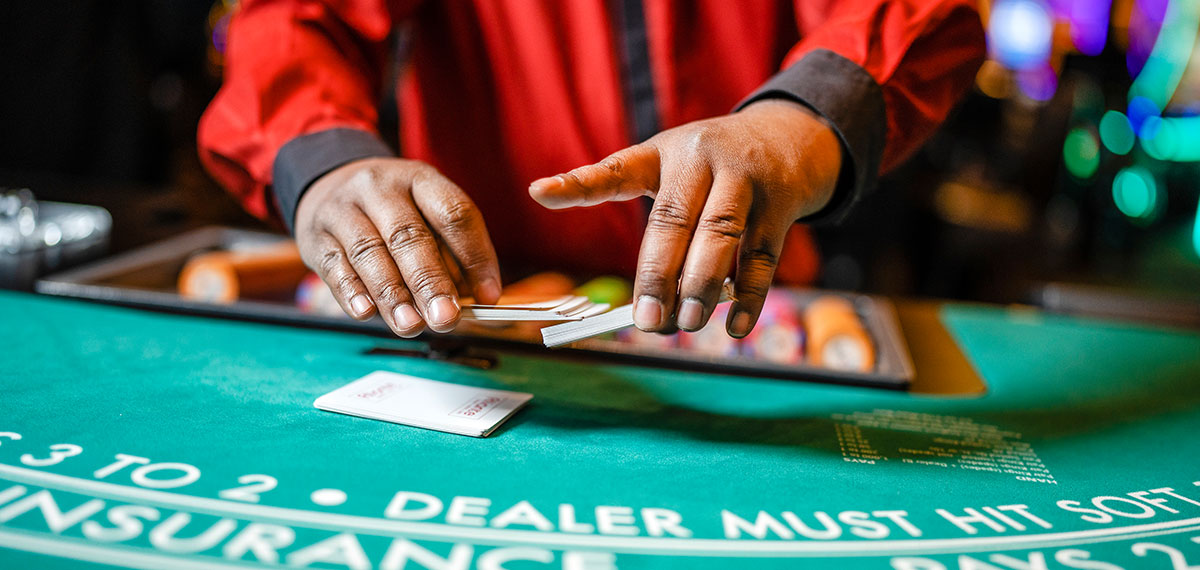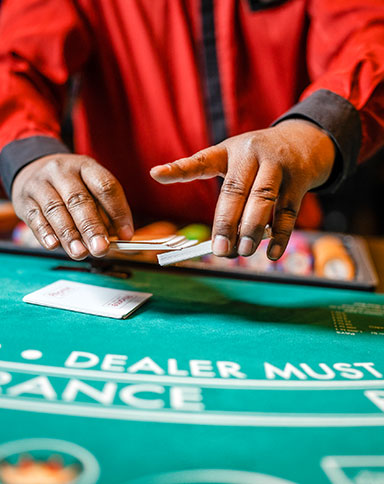

Blackjack Gaming Guide
One of the most popular card games in the world
Much of blackjack’s popularity is due to the mix of chance with elements of skill. When 21 was first introduced in the U.S. it was not very popular, so bonus payouts were offered to get players to the tables. One such bonus was when the player’s hand consisted of the ace of spades and a black Jack (either the Jack of clubs or the jack of spades). The hand was called a “blackjack” and the name stuck to the game.
The object is to draw cards that add up to 21 or as close to it as possible. You are responsible for computing the point count of your own hand. The Jack, Queen and King count ten. The Ace counts as one or eleven. All other cards are counted at their face value. Exceeding 21 is a “break” and you automatically lose. Depending on the total of your original cards, you can “stand” (draw no more cards) or take a “hit” (draw one or more cards – one at a time until you are satisfied with your count). *If your total count is 21 or less and the point count of the dealer is in excess of 21, you win and the payout odds are 1 to 1. If your hand and the dealer’s hand both total under 21 but your total count is higher, you win and the payout odds are 1 to 1. If you “break” (over 21), you lose, even if the dealer breaks. If your count is the same as the dealer’s it is a standoff, or a “push”. Should the dealer draw a 3 or more card 21, this does not beat your 2 cards 21 (Blackjack). If you have a 3 or more card 21 and the dealer has a 2 card 21 (Blackjack), you lose. If you achieve a score of 21 in two cards and a dealer achieves a score of 21 in more than two cards, you win.
The Dealer must draw with 16 and hits "soft 17." The dealer stands on a hard 17 and all totals of 18 or higher. In this game, everyone plays against the dealer's "hand". The dealer starts the game by dealing each player two cards from the dealing shoe, face down. The dealer’s hand is dealt one card up and one card down. (The down card is called the “hole” card). The dealer is not to look at the face of the “hole” card until all additional cards have been dealt and all players’ hands have been acted upon. If the first two cards dealt to a player or dealer are any Ace and any 10, Jack, Queen, or King, the hand is considered a Blackjack.
Blackjack – if the first face up card dealt to the dealer is 2, 3, 4, 5, 6, 7, 8 or 9 and you have a Blackjack, the dealer shall announce and pay the Blackjack odds of 3 to 2 and shall remove your cards before any player receives a third card.
If the first face up card dealt to the dealer is an Ace, King, Queen, Jack or 10 and you have Blackjack the dealer shall announce the Blackjack but shall make no payment nor remove any cards until all other cards are dealt to the players and the dealer received his second card. If, in such circumstances, the dealer’s second card does not give him Blackjack, your Blackjack shall be paid at odds 3 to 2. If however, the dealer’s second card gives him Blackjack, the wager of the player having Blackjack shall be voided and constitute a push.
Insurance Wagers
Whenever the first card dealt to the dealer is an Ace, you have the right to make an “insurance wager” which wins if the dealer’s second card is a King, Queen, Jack or 10 and loses if the dealer’s second card is an Ace, 2, 3, 4, 5, 6, 7, 8 or 9. Up to half of the initial wager may be bet as insurance after the second card is dealt and prior to any additional cards being dealt. Wining “insurance wagers” shall be paid to odds of 2 to 1.
Doubling Down
You may “double down” on any first two cards, this includes "splitting" your cards with the exception of aces. You must make an additional wager not in excess of the amount of your original wager. Only one card is dealt to the hand.
Splitting Pairs
You may split two cards of identical value by making a wager on the second hand so formed in an amount equal to the original wager. You may split up to three times for a total of four hands on any identical cards with the exception of aces. Aces may be split once, unless you are playing a shoe game.
 Log In
Log In